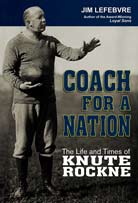Analysis
It all started with the Big Ten’s announcement last December that it was to begin a study of possible expansion, over a period of 12 to 18 months. It would be a deliberate, thoughtful process meant to identify and vet the school or schools that would be the best fit – academically, athletically, culturally.
So much for discernment and deliberation.
The Big Ten’s decision to invite Nebraska to be its 12th member starts what many expect to be a domino effect on nearly all of big-time college athletics.
Texas and Texas A&M, meeting today, may well decide to implode the Big XII and lead a mass exodus to what would become the Pac-16.
The SEC has vowed it won’t take a backseat to anyone, and may be poised to raid the ACC of some of its marquee members.
And the Big Ten has made noise about expanding in stages, leaving open the possibility of putting a major dent in Big East football institutions.
Where does all this leave the Irish?
I think it’s safe to say that the vast majority of ND followers echo the sentiments of Athletic Director Jack Swarbrick – that football independence is core to what Notre Dame is about, and will be the preferred alternative.
Unless forced otherwise.
Now what does that mean? Waaay too many national sports pundits have made categorical statements like, “Notre Dame will be forced to join a conference,” without providing a scintilla of evidence to back that claim.
They say a decimated Big East would leave ND without a conference for its sports other than football (and hockey). Oh, really? First of all, nearly half the Big East schools don’t play big-time college football to start with. Does losing, let’s say, Pittsburgh and Rutgers mean the rest of the schools just fold their tent? Unlikely.
But let’s say the Big East does evaporate. As one wag opined, “Mid-American, here we come. Hey, we can save on travel with all the bus trips.”
OK, maybe the MAC wouldn’t be the best fit, but certainly a conference like the Atlantic 10, already a very viable basketball conference with the likes of Xavier and Temple, would be a reasonable home for Irish hoops and other sports.
But back to the main course – football.
Well, the so-called experts say, conference expansion could leave schools like Michigan, MSU, Purdue and USC unable to continue their series with Notre Dame.
Huh?
It doesn’t matter if a conference has 8, 12, 16 or 66 schools – teams are still only going to play eight (or in the Pac-whatever, nine) conference games a year. They will all still have their three or four non-conference openings available. How is that going to change schools’ ability or interest in playing the most storied program in college football history? Is a conference going to institute a ban on playing non-conference games against ND?
The only foreseeable way that Notre Dame gets forced into a conference would seem to be if the newly-structured conferences set up the BCS to literally make it impossible for ND to be considered for national championship game contention.
And, really, how likely is that? How does that benefit anyone?
Of course, it’s tough applying logic to a situation that, in many respects, seems totally illogical.
Nebraska is walking away from a century-old tradition of playing in a conference with long-time rivals Kansas and Missouri, to get to play….Indiana and Purdue?
And how is that travel going to work from Lubbock, Texas, to Pullman, Wash., when Texas Tech and Washington State hook up….in volleyball, tennis or cross-country, not to mention football.
Let’s face it, this is mostly a money grab by schools and conferences that are convinced they need – and can get – more, more, more. But is it really progress?
Since we spend a lot of our time studying the Rockne era, we always ask ourselves, “What would Rock think of all this?” And there’s no doubt he was a forward-thinking visionary who literally brought college football coast to coast, and into the age of high tech mass communications (aka radio).
But I think he would ask, “Is this what’s really needed to grow the game?” Remember, he traveled the country teaching coaches of all levels and backgrounds how to make football a tremendous experience for shaping young men to be contributing adults.
College football teams chasing after television “eyeballs” and wads of cash does nothing to accomplish that.






